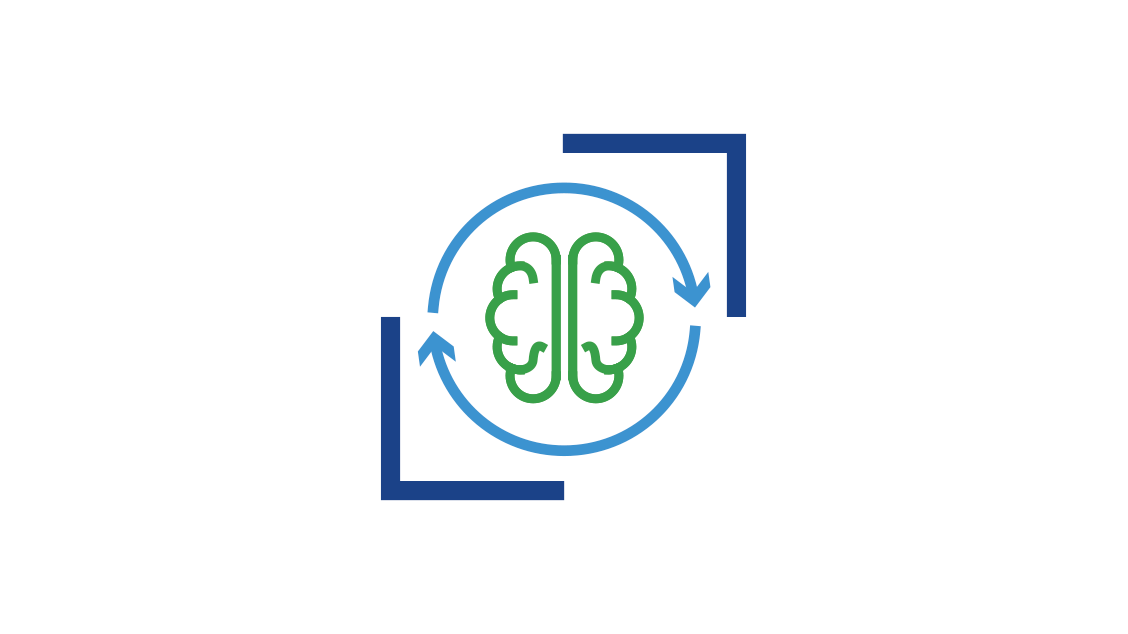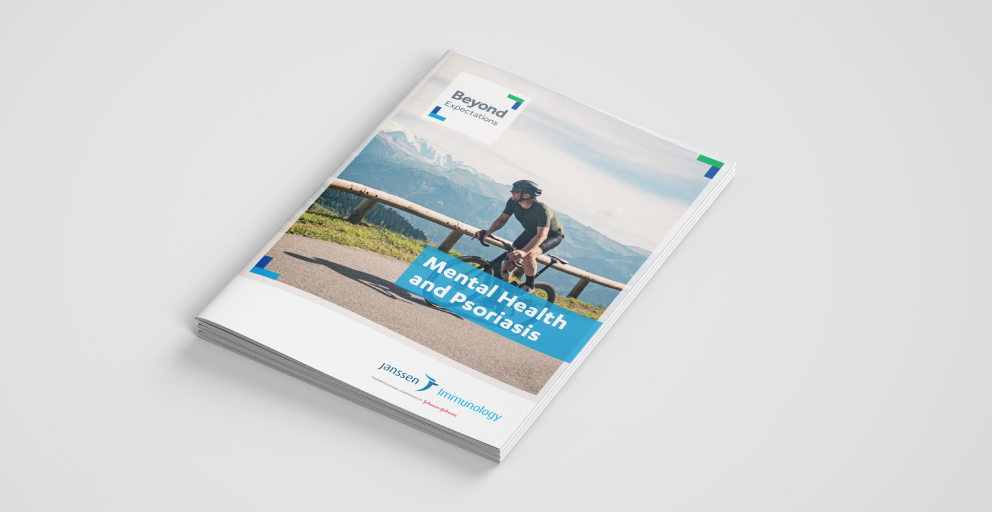Looking After Your Mental Health
Look after your mental health

It’s common to feel frustrated or overwhelmed, and your wellbeing and quality of life may be affected.
If you feel frustrated or in pain, it might make you avoid social situations or keep you from getting on with your daily life.
In fact, if you have psoriatic disease, studies show you may also suffer from depression, anxiety and stress.
If these symptoms go unrecognised and untreated, they can prevent you from effectively managing your PsA, which could affect both your physical and mental health. Stress can even affect how well you respond to treatment, trigger flare-ups or make the PsA worse.
TOP TIP
It’s important to talk - ask your support network for help
if you’re worried about your mental health
Watch out for the signs
While anyone may struggle with their psychological wellbeing, it’s more likely for people with long-term health conditions, like psoriatic disease. Depression is more common in people suffering from PsA than those with psoriasis alone, so watch out for the signs, which include:
- Trouble sleeping
- Feeling sad or hopeless
- Low energy
- Loss of interest in things
- Difficulty concentrating
However, some PsA symptoms, such as fatigue, aches, pains or joint stiffness, are also common in depression, so if you’re wondering whether what you’re feeling is psoriatic arthritis, or something more, please seek help from a professional. While it can be tricky to speak about your feelings, general practitioners and specialist consultants will be able to help you figure out if you have depression and offer you support or direct you to where you can access it.
If you are having suicidal thoughts, please contact your local healthcare professional immediately or visit an emergency room and let a friend or family member know.

Visit Gamian.eu for mental health support
You may also find information about support networks local to you
Don’t feel daunted reaching out - general practitioners are often the first health professionals people contact about mental health
Remember you’re not alone
Over the duration of disease
- Approximately 50% of people with psoriasis skin lesions report feeling rejected as a result of their condition
- People with PsA are twice as likely to suffer from depression than those with psoriasis alone
- 60% of people report a lack of understanding from friends and family
- At least 50% of PsA patients experience fatigue
- Over 50% of people with PsA suffer from at least one other disease, so mention it to your doctor if you notice anything new
The effect of PsA is personal

The connection between chronic illnesses and mental health conditions is well documented, but even though these challenges are common in illnesses like PsA, they vary from person to person. For example, one person may struggle with pain, while another may not. Someone else may have moderate fatigue, while another suffers severely, and another still copes with joint pain, fatigue and itchy and uncomfortable skin plaques.
Remember, no matter what your physical psoriatic arthritis symptoms are, it’s just as important to manage your mental health, and seek help when you need it, as it is to manage your treatment.
Think about opening up
It might feel tough to start a conversation with friends, family or colleagues about depression, and you may find the following suggestions helpful:
- Have the conversation in a setting that makes you feel safe and relaxed
- Choose to speak to someone who you feel comfortable and safe with
- Talk while doing something else with your loved one, for example, going for a walk or a drive
- Ask a healthcare professional to join the conversation – or help you prepare for it – to provide guidance and a neutral point of view
- Have several short conversations instead of trying to explain everything in one go
If you’re ready to talk about your mental health with others, you’ll find useful tips, including how to start the conversation, what to focus on, tips for your loved ones if you’re the one suffering, and more at breakingdepression.eu.

Maintaining good relationships can be difficult at the best of times, but adding a long-term condition into the mix may make things even more complicated. This guide aims to give practical advice on how to navigate different types of relationships when psoriatic disease is part of the picture.
8 steps to managing your mental health

Obesity and weight gain have been identified as risk factors for PsA, which could contribute to your stress levels. Exercise is a great way to manage these risk factors, as it not only helps to keep your weight in check, but also reduces the pressure on your joints, boosts your mood by releasing endorphins and lowers inflammation, which could help ease your symptoms.17
If exercise is too difficult to manage, then meditation or mindfulness, spending time doing something you enjoy, or talking openly with your friends and family, may all help your state of mind.18

People with PsA who get social support – be it from friends, family, co-workers, or even from fellow patients on a forum – feel better day-to-day, and are likely to be happier. Read the Psoriasis and relationships guide, or take a look at the Connecting with others section on speaking to the people in your life.

When you’re feeling low, you might find it easier to deal with the mental health implications of your PsA if you stop worrying about the future and the hurdles you might face. Try to focus on the present moment, rather than the bigger picture.18

You might know a lot about PsA already, but whether you’re an expert or someone who’s just found out about psoriatic arthritis, keep yourself educated with the latest news and what’s on the horizon. You can find more about currently available treatments in the What treatments are out there section.

A life-long condition like psoriatic arthritis may make some people feel as if they’re not in control. With the right support and treatment, your physical and mental health can be managed.19 If your condition improves, your depression might too, so take your treatment as your doctor has prescribed and go back to them if you aren’t getting the results you want.

Being outside, even on a cloudy day, exposes you to light, which could help reset your biological clock and help you sleep better.20 Better quality sleep can help improve your mental health, and light therapy is also used to treat both mood disorders21 and psoriasis skin symptoms.22
Do be careful though, as over-exposure to sunlight could make any psoriasis plaques worse, so it is important to wear sunscreen, including on any psoriasis plaques - speak to your doctor about which sunscreen to use.23 It’s also important to consult your doctor on the appropriate amount of time to spend in direct sunlight,23 especially if you’re using certain treatments for skin plaques as some can make you more sensitive to the sun.24

Visiting forums or patient organisation websites where you can speak to others with PsA and hear from people who have struggled in the same way that you have, may help you feel less alone. In Europe, a good starting point is EUROPSO, a patient advocacy group for all European country-level groups. You can use the website to find local groups and lots of valuable tools and information on how to manage the condition.

Everyone has times where they feel a bit low, but depression is different,18 and anyone can experience it.25 If you suffer from a long-term condition like PsA, this could increase your risk of depression,18 so if your low mood has lasted two weeks or more, if you’re struggling to handle your daily life, or you’re finding it impossible to enjoy the activities you used to love, it could be a sign that you’re depressed.26
Make an appointment to see a doctor so that they can see if this is the case, prescribe you treatment for depression, if appropriate, and advise you on other measures that could help.18 These may include different types of talking therapy:20
- Cognitive behavioural therapy (CBT), which focuses on how your thoughts and beliefs affect your feelings and behaviour and helps you to develop coping mechanisms and retrain your reactions.27
- Interpersonal therapy (IPT), which helps people with depression who may have difficulties relating to or interacting with others, by working through relevant aspects of relationships.28
- Counselling, which involves the counsellor listening to you talk about your difficulties without judgement or criticism, to provide insight and help you find your own solutions to problems.29
Some medical treatments for mental health may cause PsA symptoms to flare,30 so it’s important to ask your healthcare professional for guidance

Psoriatic disease can have a deep impact on the people who live with the condition. This patient guide aims to provide useful advice to help people with psoriatic disease manage their mental health.
You may be interested in

There isn’t a one-size-fits-all with PsA treatment – your doctor can help.

Everyone’s different, but you may find the classic signs familiar.

Advice about dealing with the main PsA symptoms.
